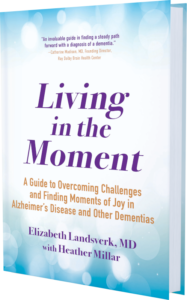Dr Liz Has Helped 100s Of Caregivers Manage The Dementia Journey
DEMENTIA CAREGIVERS
Is the stress of caregiving weighing you down? Do you struggle with too many doctors, conflicting answers, and too many medications? Are you looking for solutions to the challenges that make the elders miserable, such as, untreated pain and medications causing agitation? You are in the right place!
The Dementia Journey Starts Here

BENEFITS OF EARLY DIAGNOSIS OF DEMENTIA
Early diagnosis of dementia is critically important because some forms are irreversible and worsen over time. There can be many symptoms, including memory loss, language difficulties, and problems with concentration and eyesight. A professional can guide you in the diagnosis. It’s essential to have all medical concerns checked by a doctor, as sometimes situations can worsen when left unchecked. The sooner a problem is diagnosed, the sooner the patient is on the path to recovery and feeling better. You would hardly believe the number of common medical issues and ailments easily avoidable just by going to the doctor. Yet we see the same things year after year. There’s more information here outlining the symptoms and what to look for. Having a professional to speak with and step you through the process of what to do next in seeking an early diagnosis can be helpful.

DEMENTIA MEDICATIONS
Updated prescriptions keep the care compassionate and strong, making your caregiving tasks more effective. While we want to minimize the use of all drugs, our professional experience and literature reviews found that medications can help dementia patients. We are interested in helping you sort out the issues and prioritize the “goals of care” that are appropriate for you, your family, and especially your loved one with dementia.

DEMENTIA PERSONALITY CHANGES
Watch for memory lapses, depression, anxiety, discouragement, anger, and taking longer to learn new things. Interventions include empathy, diagnostic tools, counseling, and medication. Sometimes it helps to add another caregiver to the schedule to give you a break. If symptoms persist or advance, consider seeing a doctor with the senior to evaluate troubling behavioral symptoms. A geriatrician uses special mental performance tests and can suggest ways to increase alertness and cognitive engagement. Finally, we put together this post to help you understand and cope with behavioral changes in elders. If this is all just too much for you right now, talk with a professional to talk to, guide you along the way, and sort out all the details.

Living in the Moment
A book by Dr Liz
A loved one’s dementia diagnosis can leave you feeling scared and overwhelmed. Now a renowned geriatrician who has helped thousands of families live happy, engaged lives — after a dementia diagnosis — shares her expertise in this easy-to-follow guide.
Filled with must-have information, practical advice, and unique and comforting insights, here is everything you need to know about caring for your loved one and making his or her life the best possible — starting now, even as the disease progresses.

Dementia Counseling
We offer caregiver problem-solving and geriatric medical assessments by working with patients, doctors, and caregivers to coordinate care for the best possible outcome. When so many options exist, you may benefit from a personalized one-to-one educational consultation with our experts in dementia to help you navigate your challenges.
Capacity is Critical
If you follow the news, and you've been following the most recent charges former President Trump now faces, you've likely heard that one of his unindicted co-conspirators is Rudy Giuliani. A former district attorney, mayor of New York City, and advisor to former...
Alzheimer’s and Dementia Care: 31 Tips for Caring for an Elder with Alzheimer’s
Elderly individuals with Alzheimer's disease present a unique set of caregiving challenges. This article will explore some of the ways to provide optimal Alzheimer's care for an elder. We will also discuss the importance of creating a support system for both the elder...
What is Sundowning Syndrome? Is It Related to Dementia?
Mental disabilities and diseases are many and varied, and determining causes and treatments can be problematic, especially when mental ailments are linked to other diseases. Such is often the case with Sundowning Syndrome - a syndrome often seen in people with...
